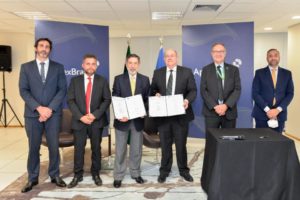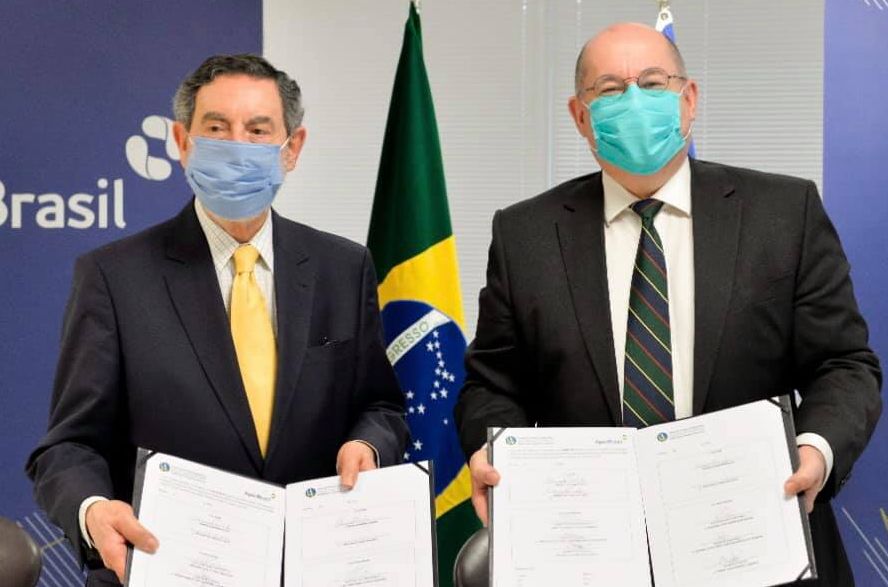Brasília – To promote the growth and diversification of trade between Brazil and the Arab countries, the Brazilian Trade and Investment Promotion Agency (Apex-Brasil) and the Arab Brazilian Chamber of Commerce (ABCC) signed this Thursday (9) a Technical Cooperation Agreement. Pictured above, the presidents of both institutions at the event for signing the agreement.
The agreement provides for a joint work plan including networking actions at Expo 2020 Dubai, which starts in October, a qualification course for Brazilian companies to adapt processes and products to the legal requirements and criteria determined to be recognized in Islamic countries, and training of Brazilian startups seeking to export in areas such as food security, logistics, sustainability, and games.

In addition, the agreement provides for holding roadshows in Brazil aimed at attracting Arab investors to customized programs in different states, focusing on the Brazilian public sector. The challenges and barriers encountered by Brazilian businesspeople operating in the Arab market to negotiate in countries in the region will be mapped. A study will be prepared to guide them on the steps necessary for setting up in the Arab countries.
For the president of Apex-Brasil, Augusto Pestana, who led the signing ceremony alongside the president of the ABCC, ambassador Osmar Chohfi, this is another action demonstrating the spirit of collaboration between Brazil and the Arab countries. “There is an extremely dense action plan here, with great growth potential, and there are many opportunities, including halal certification, which is one of the most interesting fronts of action and which will raise this partnership to a new level,” he highlighted.
Halal certification accredits companies, processes, and products following the legal requirements and criteria to be recognized in Islamic countries. Brazilian companies are already in the halal market, with products fit for Muslim consumption. Still, the agreement provides for expanding Brazilian products and promoting Brazil’s image as an essential supplier of goods for this market. For this purpose, a course on good practices and halal certification will be developed to qualify Brazilian companies already exporting or interested in exporting halal products, in addition to the organization of the Global Halal Brazil Business Forum, an event to discuss the growth of the halal market and the opportunities in it for Brazilian companies.
Chohfi spoke about the cooperative work between the ABCC and Apex-Brasil and highlighted the need to expand the range of Brazilian products in the Arab market beyond commodities. “We saw the exponential growth of Brazil in the Arab world. Today, the market is much more focused on commodities, and we will work together with Apex-Brasil to diversify this trade and introduce more value-added products. We will also work to bring small and medium-sized companies into this market, as they have great potentiality and capacity to sell,” he said.
Expo 2020 Dubai
The Expo is one of Apex-Brasil’s main agendas. Consequently, among the goals of the recent agreement is the promotion of networking between Brazilians and Arabs at the world’s fair — to be held from October 2021 to March 2022 — to increase exports and expand foreign investment in Brazil.

Visits to the Brazil Pavilion will be organized by representatives from at least four Arab countries: Saudi Arabia, Egypt, Morocco, and Qatar. In addition, spaces will be provided in the Brazil Pavilion for cultural actions promoted and previously scheduled by the ABCC.
Expo 2020 Dubai is a world’s fair, in which the main attractions are the pavilions of the participating countries. This year, it will be held in Dubai, in the United Arab Emirates. The organizers expect to attract 25 million visitors worldwide to explore innovations, ideas, and scientific and technological advances. The Expo will bring together multiple sectors, including private companies, NGOs, and government institutions, all aimed at discussing subjects such as business, technology, urbanism, sustainability, science, culture, gastronomy, and economics.
Trade Balance
In 2020, Brazil’s export revenue to the Arab countries reached USD 11.47 billion. The Arab countries thus established themselves as the third leading destination for Brazilian exports, only behind China (USD 67.69 billion) and the United States (USD 21.46 billion), and the fifth in imports (USD 5.36 billion), preceded by China (USD 34.04 billion), the United States (USD 24.12 billion), Germany (USD 8.60 billion), and Argentina (USD 7.79 billion).
Gold and soy were the products most exported by Brazil to the Arabs in 2020. Gold reached a revenue of USD 381.81 million, increasing 47.4% compared to 2019, and soy, USD 323.12 million, with a notable 68.7% growth over the same period. Agricultural exports represented 16.5% of the total; the manufacturing industry, 70.8%, and mineral extraction, 12.5%.
According to assessments and studies by Apex-Brasil, there are many opportunities for Brazilian investments in the Arab countries, including renewable energy (solar, wind, biomass, and green buildings), agriculture (systems for monitoring crops and livestock, machinery, processing, and production), technology, and infrastructure. On the other hand, opportunities to expand the Arab market in Brazil are focused on oil and gas, development and construction of real estate, and logistics infrastructure (airports, railways, roads, and ports).
Translated by Elúsio Brasileiro




